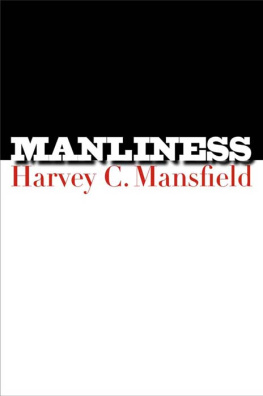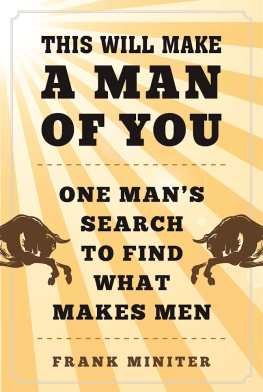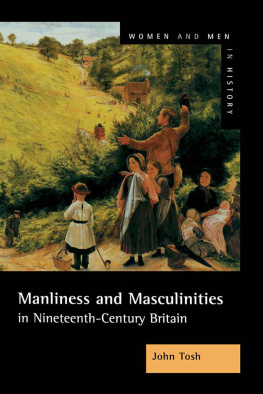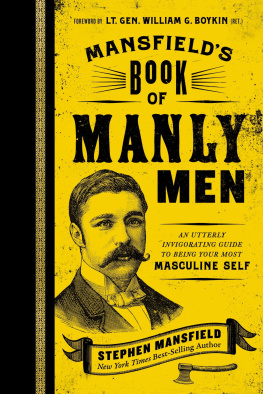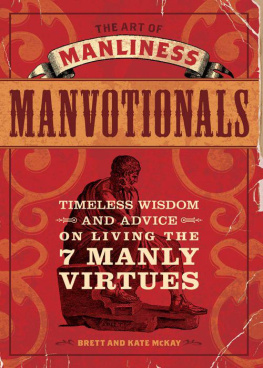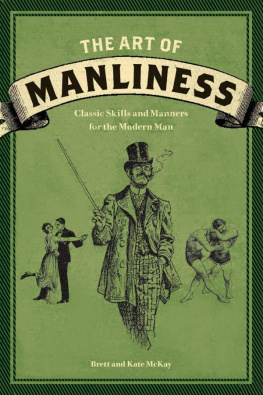Manliness
Manliness
Harvey C. Mansfield
Yale University Press
New Haven and London
Copyright 2006 by Harvey C. Mansfield. All rights reserved. This book may not be reproduced, in whole or in part, including illustrations, in any form (beyond that copying permitted by Sections 107 and 108 of the U.S. Copyright Law and except by reviewers for the public press), without written permission from the publishers.
Designed by Nancy Ovedovitz and set in Galliard Oldstyle type by Integrated Publishing Solutions. Printed in the United States of America by Vail-Ballou Press, Binghamton, New York.
Library of Congress Cataloging-in-Publication Data
Mansfield, Harvey Claflin, 1932
Manliness / Harvey C. Mansfield.
p. cm.
Includes bibliographical references and index.
ISBN -13: 978-0-300-10664-0 (alk. paper)
ISBN -10: 0-300-10664-5
1. MasculinityPhilosophy. 2. MasculinityPolitical aspects. 3. Sex role. 4. Assertiveness (Psychology) 5. Nature and nurture. 6. Feminism. I. Title.
HQ 1090. M 365 2006
305.31dc22 2005023687
A catalogue record for this book is available from the British Library.
The paper in this book meets the guidelines for permanence and durability of the Committee on Production Guidelines for Book Longevity of the Council on Library Resources.
10 9 8 7 6 5 4 3 2 1
For Delba
Preface
T his book is about manliness. What is that? Its best to start from examples we know: our sports heroes, too many to name; Margaret Thatcher, the British prime minister who is the mightiest woman of our time (What! a woman, manly?); Harry S. Truman, who said the buck stops here; Humphrey Bogart, who as Rick in Casablanca was confident and cynicalcool before cool was invented; and the courageous police and firemen in New York City on September 11, 2001. Manliness seeks and welcomes drama and prefers times of war, conflict, and risk. Manliness brings change or restores order at moments when routine is not enough, when the plan fails, when the whole idea of rational control by modern science develops leaks. Manliness is the next-to-last resort, before resignation and prayer.
We today inhabit a society with a very new justice, long overdue: the gender-neutral society. In this new society your sex does not determine your rights, your duties, or your place. The gender-neutral society regards sex as an irrational hindrance to freedom because it subordinates women to men, and to efficiency because it misuses their abilities. Manliness, the quality mostly of one sex, gets in the way of an equal or reasonable distribution of tasks and rewards; it seems to promote a bias in favor of men over women. In this book I begin from manliness as the irrational obstacle to a rational project that seeks to remove this bias. By the end I hope to convince skeptical readersabove all, educated womenof the reverse: that irrational manliness deserves to be endorsed by reason.
I was going to call this book a modest defense of manliness, but manly men are not modest, and I do not want to sound like a wimp or to begin by looking down on manly men. Modest defense is my conclusion, however, in view of the good and bad in manliness that most anyone can see. The goodthe manly rescuers on 9/11seems necessary to us, just as the badthe manly attackers on that dayseems very unnecessary. But can you have the good without the bad? Most good things, like French wine, are mostly good and accidentally bad. Manliness, however, seems to be about fifty-fifty good and bad. If it is good, maybe thats because its the only remedy for the trouble it causes. This is what I mean by a modest defense.
Manliness is something that affects us all, something that most anyone can see. Common sense has a lot to say about it. For the most part, I take the side of common sense. I like its forthright defense of stereotypes regarding the sexes. I am not so friendly to the two sciences that treat manliness, social psychology and evolutionary biology, even though they, too, largely support those stereotypes. The evidence the social psychologists compile on the differences between the sexes is useful for refuting those who deny sex differences or regard them as easily changed, and there is fascination in being shown small but significant differences in the ways that men and women do the same things in daily life. These differences are observable by anyone who cares to look and available in the stereotypes of common sense, but it is reassuring to see science catch up with truth and confirm in interesting ways what we already know.
On the whole, however, I am quite critical of the scientific understanding of manliness, whether in social psychology or evolutionary biology. These sciences see manliness at its lowest as aggression and altogether fail to consider the phenomenon of manly assertiveness. A manly man asserts himself so that he and the justice he demands are not overlooked. He rouses himself and seeks attention for what he deems important, sometimes something bigin the case of the New York uniforms and the Islamic fascists, the nature and value of Western civilization. These sciences, and science generally, are uncomfortable in the presence of big questions of human importance like this one. This is a severe limitation for the study of manliness that I cannot accept.
And science does not even understand aggression correctly or fully because it is completely ignorant of the phenomenon of thumos, known to Plato and Aristotle but later abandoned because it was inconvenient to the agenda of modern science. Thumos is a quality of spiritedness, shared by humans and animals, that induces humans, and especially manly men, to risk their lives in order to save their lives. Thats a paradox familiar to all human beings who ever get angry. But it is a fact almost unknown in the scientific literature on manliness. As manliness is made out of that paradox, it is, to say the least, more complicated than the simplistic drives of aggression, domination, and self-preservation to which science tries to reduce manliness. I have done my best to develop assertiveness and thumos as features of manliness, and my bookheres an example of a manly assertionis the only ready-to-hand treatment of manliness in these two respects and as a whole that you will find.
When I say that I develop these two features I mean, first, that I go beyond the scientific treatments of manliness, interesting though they are. After offering criticisms of social science and Darwins biology I turn to the many productions of literature and philosophy that will teach us about manliness. Here is such profusion that I must select only a few among those that might be relevant. Not many books have been written solely on manliness, but almost every great writer or thinker has had something to say on the subject. I bring together a certain number of them: some whom I find striking, such as William James and the Stoics; some who are too good to miss, such as Teddy Roosevelt, Tarzan (not a writer but smarter than you think), and Hemingway; and two who are essential, Plato and Aristotle. I know that some readers will doubt that you can really learn anything solid from high talk lacking in numbers and graphs, but my advice is to wait for the results. While waiting, try out the thought that fiction and nonfiction are alike in aiming to present the truth.
Drawing from a number of sources, I present them in episodes that do not follow chronological order but are connected by the argument. The argument develops from what we appreciate best, the stereotypes of manliness, to what we appreciate least but need most, the wisdom of Plato and Aristotle. Do not be surprised, then, if the definition of manliness changes as the argument ascends from aggression to philosophical courage.
Another peculiarity in my book is to treat the levels of manliness. Most studies search for unfailing characteristics of all males and are thus confined to the lowest common denominator, which might be maleness or masculin-ity. But manliness has more than one level. Manly men are given to passing adverse judgment, and not only on women but also on other males who do not meet their exacting standards. Manliness at one level might be universal to all males but at another level common to only the few most manly malesand these few might be joined by a few manly women. Beyond these levels manliness is a virtue (despite what I said above about its being neutral between good and evil), the virtue of courage or perhaps of gentlemanliness; and beyond that might be found manliness in thinking, the courage to challenge conventional beliefs.
Next page
